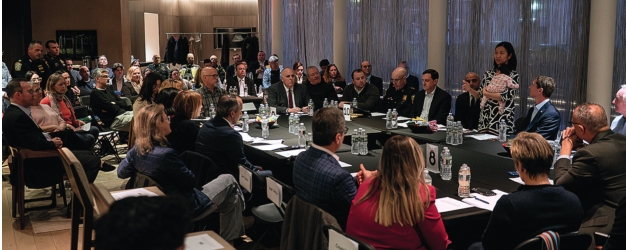
Public officials are planning a Downtown public safety task force this spring after a “productive” closed door summit last Thursday.
Over 90 people from 45 organizations attended the meeting, including Mayor Michelle Wu’s team, five Downtown residents and nine senior members of the Boston Police Department. The summit was organized by the Downtown Boston Neighborhood Association (DBNA).
The DBNA will release a public list of next steps from the summit later in the week. This will include the launch of special task forces focused on different public safety issues in the neighborhood, like legislation, parks or homelessness.
“What I asked everybody to do coming out of that meeting is answer one simple question. What is the one thing you’re prepared to commit to doing to impact public safety?” said Rishi Shukla, the head of the DBNA. “One specific example is that the mayor has volunteered to co-chair some sort of organizing task force to govern what we do [for public safety] next year.”
The Downtown saw its highest crime rate in seven years in 2024, with a total of 995 crimes reported, including drug dealing and shoplifting.
This
is despite the fact that violent crime in the city as a whole slightly
decreased. Police officials announced in December, for example, that
there were only 24 homicides. Police Commissioner Michael Cox said at
the time that the city has never been safer.
However,
a survey conducted by the DBNA in November found that 70 percent of
residents felt less safe in the neighborhood than they did at the
beginning of 2024. Shukla said that he had started planning the summit
with elected leaders some time ago, after a city council hearing in
November that discussed quality of life issues in the neighborhood.
“Our
summit was planned for this date a few months ago,” Shukla said. “In
parallel, there were a series of other things happening. Petty crime
issues, the congressional hearing on sanctuary city status on Wednesday,
which puts another spotlight on safety. Things started to come to a
head here.”
Attendees
said the meeting focused mostly on drug dealing and drug use, both of
which have plagued Wu’s administration. In 2022, the city carried out a
public health emergency response to clear the permanent homeless
encampment on the intersection of Massachusetts Avenue and Melnea Cass
Boulevard (Mass. and Cass), which had become widely regarded as the
epicenter of the city’s drug problem. Since then, however, drug use and
drug deals have been reported more frequently across the city, as
officials now must deal with the spillover.
The
city’s Coordinated Response Team, which was responsible for clearing
the Mass. and Cass encampments and has since led the charge on getting
drug users into treatment, has also filed a memo to the city council
stating it plans to increase police coverage in drug hotspots around the
city.
Shukla said
that, since all departmental leaders were in the same room at the
summit, concrete change in the Downtown wouldn’t get caught up in
bureaucracy.
“People
are taking this really seriously,” Shukla said. “Once you put out to the
public what the commitments are that people are making, you can’t hide.
All of us have to deliver.”